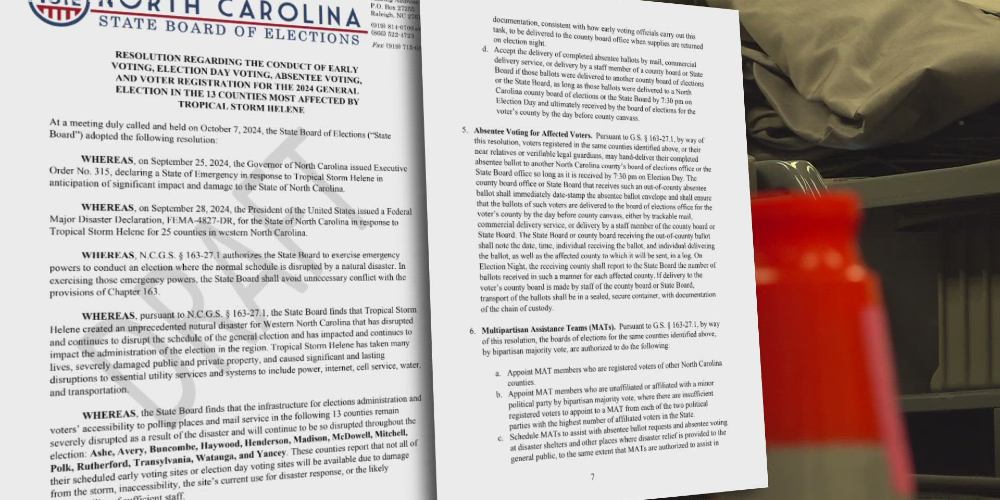The North Carolina State Board of Elections unanimously passed measures attempting to address concerns about hurricane-ravaged western counties leading up to the Nov. 5 presidential election.
With the notable exception of the more metropolitan Asheville, county seat of Buncombe County, most of the hardest-hit North Carolina counties in the path of Hurricane Helene are rural and lean Republican.
But the state election board for the fiercely contested battleground state—former President Donald Trump is neck and neck with Vice President Kamala Harris—has a 3-2 Democratic majority.
Harris and Trump are polling less than 1% with one another, according to the Real Clear Politics polling average, and past presidential contests have been tight in the state.
The election board unanimously voted Monday to allow 13 counties most affected by the storm to make changes in election procedures, so long as there is a bipartisan majority to do so.
The process would include changing or adding voting sites and notifying voters by mail and through local media about such changes as quickly as possible. The resolution adopted by the state board allows the chairman of local election boards to appoint replacement members if someone is unable to carry out his or her duties.
“These measures were put in place to ensure the victims of Helene can vote in the upcoming election and provide election officials in the hardest-hit areas the tools they need to conduct a secure election under extraordinarily difficult conditions,” Karen Brinson Bell, executive director of the North Carolina State Board of Elections, said Monday during a teleconference with reporters.
I am in Big Oak Park, a mobile home community 30 mins south of Asheville.
Its residents, many of whom are 55+ years-old and at-risk have been without power for 10 days.
Residents tell me that trash has been building up, inviting disease and bears.
More to come. pic.twitter.com/kOTZHXxH9b
— Tim Kennedy (@TimKennedyJr1) October 6, 2024
“While several of North Carolina’s neighboring states have moved to implement those lessons, North Carolina’s Gov. Cooper has been shockingly inactive, as have his allies on the state board,” he said.
The Tar Heel State has become a major battleground for the 2024 presidential election. In 2020, incumbent Republican Trump carried the state against Democratic challenger Joe Biden by just 1.3%. In 2016, Trump beat Democrat Hillary Clinton in North Carolina by less than 4% of the vote.
In-person early voting begins Oct. 17. Mail-in voting began Sept. 21, after a brief delay to accommodate a court ruling to remove independent presidential candidate Robert F. Kennedy Jr.’s name from the ballot.
“We have every intention of starting early voting as scheduled on Thursday, Oct. 17, in all 100 counties,” Bell, the state election board’s executive director, said.
Meet Dianne Messer, who, along with Doug Warden, who is 93-year-old, run Big Oak Mobile Park in Hendersonville, North Carolina.
Dianne was kind enough to show me around the property and introduce me to some of the residence, many of whom have been without power for 10 days.… pic.twitter.com/tRZuvYhqi9
— Tim Kennedy (@TimKennedyJr1) October 6, 2024
“While several of North Carolina’s neighboring states have moved to implement those lessons, North Carolina’s Gov. Cooper has been shockingly inactive, as have his allies on the state board,” he said.
The Tar Heel State has become a major battleground for the 2024 presidential election. In 2020, incumbent Republican Trump carried the state against Democratic challenger Joe Biden by just 1.3%. In 2016, Trump beat Democrat Hillary Clinton in North Carolina by less than 4% of the vote.
In-person early voting begins Oct. 17. Mail-in voting began Sept. 21, after a brief delay to accommodate a court ruling to remove independent presidential candidate Robert F. Kennedy Jr.’s name from the ballot.
“We have every intention of starting early voting as scheduled on Thursday, Oct. 17, in all 100 counties,” Bell, the state election board’s executive director, said.
This is how high the water got during hurricane Helene over a week ago in
River Arts District, Asheville pic.twitter.com/RgNdOgYrLr
— Tim Kennedy (@TimKennedyJr1) October 6, 2024
Hurricane Helene made landfall first in Florida, then swept through parts of Georgia, North Carolina, South Carolina, Tennessee, and Alabama, killing more than 220 and leaving catastrophic property damage. Of these states, North Carolina sustained the worse beating.
Cuccinelli’s Election Transparency Initiative noted one reported concern that relocated nursing home residents won’t be able to vote.
The elections watchdog group also noted that it’s still unknown which preapproved polling sites are unserviceable in the 22 counties affected by Helene. North Carolina law requires the election board to approve alternate sites.
Also, suspension of deliveries by the U.S. Postal Service in the state’s western counties disrupted mail-in voting.
Cuccinelli said Cooper and the elections board should “stop stalling and start working to ensure that those communities already devastated by Helene at least have their voice through their votes.”
Cuccinelli, also a former Virginia attorney general, specified two top North Carolina Republicans who could do this.
“To the extent Gov. Cooper refuses to make immediate adjustments, when the General Assembly convenes next week we urge swift action from House Speaker Tim Moore and Senate Leader [Phil] Berger to maintain the integrity of the upcoming election across the western counties of North Carolina—ensuring it proceeds securely and fairly without compromising the democratic process,” Cuccinelli said.
Cooper’s office did not respond to inquiries from The Daily Signal by publication time.
Patrick Gannon, a spokesman for the North Carolina State Board of Elections, referred The Daily Signal’s request for comment to the governor’s office, but also sent an email statement from the board arguing that criticism of the state is “uninformed.”
“The State Board of Elections is committed to ensuring every eligible voter is able to cast their ballot, regardless of their circumstances following the disaster,” the board’s statement said, adding:
The affected counties and their staffs are working around the clock to guarantee their neighbors their right to vote. Criticism like this is simply uninformed. It’s also a slap in the face for the dozens of election workers, especially those who are themselves victims of the disaster, who are putting in long hours under trying circumstances to serve their voters.
Hendersonville, North Carolina | Alexander, a resident of Big Oak Park, gave me a tour of his community yesterday.
Many of the trailers destroyed by hurricane Helene are uninsured and
Some belong to families with newborns. @DailySignal pic.twitter.com/XcMQ315EEK— Tim Kennedy (@TimKennedyJr1) October 7, 2024
The board provided increased flexibility to these 13 counties: Ashe, Avery, Buncombe, Haywood, Henderson, Madison, McDowell, Mitchell, Polk, Rutherford, Transylvania, Watauga, and Yancey.
The board’s Democratic chairman is Alan Hirsch, president of the North Carolina Healthcare Quality Alliance, a nonprofit focused on rural treatment of opioid addiction and prevention as well as on mental health issues.
Hirsch has donated thousands of dollars to Democrat campaigns, including the state’s Democratic Party, then-President Barack Obama, and Cooper, the sitting governor, according to Open Secrets.
Bell has been executive director of the North Carolina Board of Elections since 2019. She is listed on the board’s website as the state’s “chief elections official.”
Bell previously was the election board’s deputy director beginning in 2015. She oversees 100 county election boards.
Bell has worked in administrative roles for county and state elections since 2006. From 2011 to 2015, she directed the election board in Transylvania County, which is heavily Republican-leaning. Before that, she was a district elections technician for the state board.
In a Monday op-ed in Townhall, former Ohio Secretary of State Ken Blackwell, a Republican, noted that about 40,000 mail-in ballots were sent to voters in Helene-affected counties and that only 1,000 were returned.
“These hard-hit counties, which supported Donald Trump with 61% of the vote in 2020, are now grappling with slow recovery efforts, unreliable communications, and an inadequate federal response,” Blackwell wrote. “As citizens in rural, heavily Republican regions seek to participate in the democratic process, the state’s electoral integrity is on the line, especially as concerns about political maneuvering grow in the aftermath of the storm.”
Blackwell also warned against sweeping statewide changes that could undermine confidence in the Nov. 5 election.
-
Learn the TRUTH about Gold IRAs and how most precious metals companies play dirty.
“Expanding voting measures across the entire state, including areas that were not affected by the hurricane, could open the door to accusations of partisanship,” he wrote. “It’s important that we help the residents of these rural, counties without altering the broader electoral landscape in a way that might be seen as tipping the scales.”
Tim Kennedy contributed to this report.




